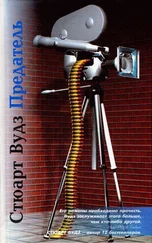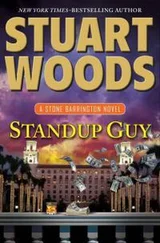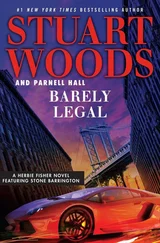“You’re right, I didn’t dig deep enough.”
Joan buzzed again. “Gloria on two.”
“I’ll call you back,” Stone said to Dino, then pressed two. “Good morning.”
“It certainly is,” Gloria said. “I wish I were still there.”
“Soon enough.”
“I’ve finished my story on you. I’ll send you an early copy in a day or two.”
“I hope you treated me kindly.”
“How could I not, after the way you treated me?”
“I’m glad you enjoyed it.”
“‘Enjoy’ isn’t a strong enough word.”
“Same here.”
“I’ve gotta run, my editor is screaming for me.”
“Then run.”
She hung up, and Stone called Dino back.
“Let me guess,” Dino said, “she was thanking you for the ride last night.”
“More or less.”
“Did you ask her about Danny?”
“I think I’ll wait and let her bring it up. She’s pretty talkative.”
“Let me know if you need any more research on Danny Blaine.”
“I’ll do that.” They said goodbye and hung up.
Joan buzzed again. “The secretary of state on line one.”
Stone pressed the button. “Well, good morning,” he said, with warmth.
The response was businesslike. “Will you accept a call from Secretary Barker?”
“Of course,” Stone said.
“Good morning.”
“Good morning, Madam Secretary, haven’t I seen you on a TV show?”
“Not yet, but stick around.”
“How’s the state of the world today?”
“Have you got a couple of weeks? I’ll brief you.”
“As bad as that?”
“Nearly as bad. I’ve had half a dozen texts from people who saw our photo op in the Debater yesterday, mostly those who were at our party.”
“And what was the response?”
“Uniformly favorable. Maybe being in the papers wasn’t a bad idea — it saves a lot of explaining about who you are.”
“When I got home yesterday I had a stack of calls waiting from the media.”
“And how did you handle that?”
“Somebody advised me to pick one and tell the rest I’d given them an exclusive.”
“Who did you pick?”
“ Just Folks , a name which I interpreted as being an ironic take on People .”
“You could have done worse. What did you tell them?”
“Nothing they couldn’t have learned by Googling you.”
“All the way back to Orchid Beach?”
“Briefly. Look at it this way — it will be good publicity for your upcoming autobiographical work.”
“Oh, we’re starting that far ahead, are we?”
“Remember what P. T. Barnum said, ‘... as long as they spell your name right.’”
“I suppose so, and I suppose I’ll get used to it. CIA would have frowned upon it, in the old days.”
“Those days are gone forever.”
“Well, I have to stop a war somewhere. Let’s talk now and then, huh?”
“As often as you like. You call me — you’re busier than I am.”
“You can say that again. Bye.” She hung up.
Joan buzzed again. “You’re still getting a lot of calls from media types, which I haven’t put through. What do you want me to tell them?”
“Tell them to go away, I’m not talking.”
“You talked to Just Folks .”
“That was so I could tell the others I had given the magazine an exclusive. Try that and see if it works.”
“You betcha.”
Stone had a sandwich for lunch at his desk and was still picking his teeth when Joan buzzed. “There’s a Mr. Alphonse Teppi to see you on a legal matter. You don’t know him.”
In the second before he spoke Stone recalled that some interesting turns in his life had arisen from seeing unknown walk-ins, and anyway, he was bored. “Send him in.”
Alphonse Teppi was tall and slim, dressed in a beautifully cut Italian suit and an outrageous necktie. “Al Teppi,” he said, offering his hand.
Stone shook it. “Have a seat, Mr. Teppi.”
Teppi did. “Since we don’t know each other, I’d better introduce myself.”
“Go right ahead.”
“I have a number of clients who call on my services to help select advisors for them.”
“What sort of advisors?”
“Agents, publicists, tax accountants, and, sometimes, attorneys.”
“Are you an attorney, Mr. Teppi?”
“Sadly, no, though I would have made a good one.”
In Stone’s experience people had an assortment of strange ideas when it came to judging the qualities of an attorney. “Why do you think that, Mr. Teppi?”
“A reasonable question,” Teppi replied. “Because all too often, in dealing with attorneys, it is my own ideas rather than theirs that turn out to be the better way to resolve situations.”
“Do you take that view with, say, surgeons?”
“Negativo,” Teppi replied, with a small smile.
Stone wondered if that was an Italian word, or if Teppi had just made it up. “Well, let’s start with your telling me the problem, and then I’ll render an opinion on whether you should consult an attorney or just save the fees and handle it yourself.”
“Very well. I have a client who is, for reasons not entirely of his own doing, in an institution upstate.”
“Medical? Mental?”
“Penal.”
“Ah. And you wish me to get him a new trial?”
“Oh, nothing as long and drawn out as that, I hope. I just want you to get him out.”
“Well, if you want fast action, there are, generally speaking, two ways to go — a pardon or a jailbreak. I expect this is where you begin to offer suggestions, is it not?”
“Normally, yes, but I confess I have come up short in that regard. I suppose I was thinking in terms of, ah, influence.”
“Influence of whom?”
“Oh, judges, politicians — like that.”
“Well, with judges it’s considered de rigueur in the legal game to bribe them before the verdict comes in, not later. As for politicians, their role in these things is usually to bribe a judge before the fact, or a governor, afterward.”
“I’m not explaining myself very clearly, am I, Mr. Barrington?”
“On the contrary, Mr. Teppi, not only have you been clear but admirably economical and direct in your choice of words. Attorneys appreciate that sort of thing when hearing from prospective clients. It saves so much time.”
“Let me rephrase. I had hoped that you might know someone, who knows someone, who knows an official who might be in a position, as a favor, to end my client’s confinement or, if not, then to ease the terms under which he is confined.”
“Well, as regards ending his confinement, I believe I’ve already covered the two most commonly employed methods. But if you want your client to have a job in the prison library, a single-occupancy cell, and a bodyguard in the yard, then I think you should think inside the box rather than out.”
“Inside the box?”
“The box being the one your client is in.”
“Oh. You mean someone who works in the prison?”
“Those are the people inside the box and in charge of the distribution of comforts your client wishes to acquire.”
Teppi appeared to be giving this idea considerable thought. “Perhaps, Mr. Barrington, you might describe for me, hypothetically, of course, how this might be achieved.”
“Well, hypothetically, of course, one might travel to the municipality in which the box is located and look for a tavern nearby that is frequented by employees of the institution, then spend a few nights drinking there and buying rounds for the other patrons, until a likely candidate emerges from the fog of unfamiliarity, then seek his advice, taking care, of course, to avoid any speech that might be interpreted as suborning a public official, which could lead to one joining one’s client inside the box.”
Читать дальше












